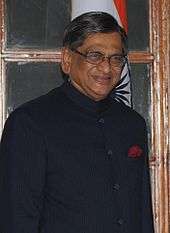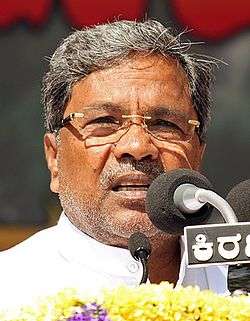1999 Karnataka Legislative Assembly election
The 1999 Karnataka Legislative Assembly election took place in October 1999 in 224 constituencies in Karnataka, India. The elections were conducted to elect the government in the state of Karnataka for the next five years.
All 224 Legislative Assembly seats 113 seats needed for a majority | |||||||||||||||||||||||||||||||||
|---|---|---|---|---|---|---|---|---|---|---|---|---|---|---|---|---|---|---|---|---|---|---|---|---|---|---|---|---|---|---|---|---|---|
| |||||||||||||||||||||||||||||||||
| |||||||||||||||||||||||||||||||||
The Indian National Congress secured a huge majority winning 132 seats.[1] The National Democratic Alliance composed of the Bharatiya Janata Party and Janata Dal (United) faction was a distant second winning only 63 seats. The Janata Dal (Secular) faction of former prime minister Deve Gowda also bit dust winning only 10 seats. The election was held simultaneously with the Lok sabha elections. The Janata Dal government collapsed in mid-1999 owing to a split in the Janata Dal. The Chief minister J.H.Patel, party president C.Byregowda and many other prominent leaders were part of the Janata dal (United) faction and along with Ramakrishna Hegde allied with the Bharatiya Janata Party[2] where as the former prime minister Deve gowda and his associates including the deputy chief minister Siddaramaiah joined the Janata dal (secular) faction. Owing to the anti incumbency against both the factions of JD, the Congress won handsomely. S.M. Krishna of the Congress was sworn in as Chief minister on 11 October 1999.[3]
Results
Summary of the October 1999 Karnataka legislature election results[4]
| Parties | Flag | Seats contested | Seats Won | % of Votes | |
|---|---|---|---|---|---|
| Indian National Congress | 222 | 132 | 40.84% | ||
| Bharatiya Janata Party (BJP) | 149 | 44 | 20.69% | ||
| Janata Dal (United) | 112 | 18 | 13.53% | ||
| Janata Dal (Secular) | 203 | 10 | 10.42% | ||
| Others | 20 | 14.52% | |||
| Total (Turnout %) | 224 | 100.0 | |||
| Source: Election commission of India[5] | |||||
References
- "Congress in Karnataka". Rediffnews.
- "JDU-BJP cracking". Rediffnews.
- "Krishna sworn in as Karnataka CM". Rediffnews.
- "1999 Election Results". Archived from the original on 26 January 2013. Retrieved 8 May 2012.
- "Key highlights of General Elections, 1999 to State Election of Karnataka" (PDF). Election Commission of India. Retrieved 29 October 2010.


